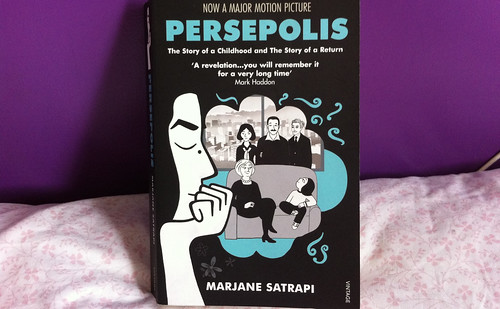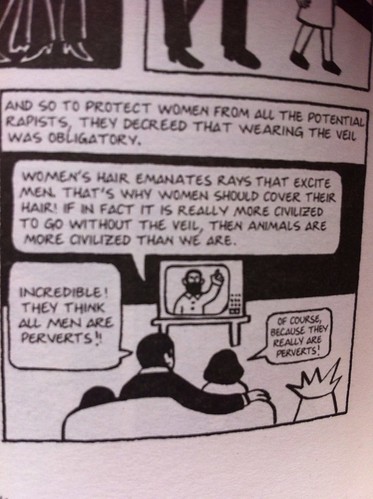 |
| Don't the colours look nice together? I only read books that match my decor. |
Laura
lent me this when she came on our little holiday in my house (about a million
months ago now...bad blogger). I like to think that my devious plan, involving
taking her to charity shops so she bought more books and couldn’t take ALL her
books home, was the reason she lent it to me. But it might have been her plan
to lend me them all along.
First of
all: Persepolis is super awesome. (The
second of all, I’m glad I’m writing this down so I don’t have to try and say
Persepolis. I said it in my mangled way and my Archaeologist father went “It’s
Persepolis” so fast that I’ve no idea how he said it.)
Persepolis
is a graphic novel by Marjane Strapi about her childhood in Iran and then her
return to Iran after spending some of her teens in Austria. Before reading it
by knowledge about Iran was this:
1) There was some kind of Cultural/Islamic revolution in the 70s
2) Comedian Shappi Khorsandi is Iranian and her family moved to Britian in the 70s because her father wrote a satirical poem
3) Iran used to be called Persia
Have you
been blown away by my knowledge?
The
first awesome thing about this book is that it’s really informative. After
reading this I actually have some idea of Iran’s recent history, including the
part that Britain played (non-spoiler: it was not good). The history of the
Middle East is SO confusing and Persepolis describes it in a way that I could
understand (I sound really thick so far...).
But the
best thing about Persepolis is that it is a personal story. It cuts through all
the distance that news reports give and the way that they can “other” people. News
never focuses on people in a way that you can relate to them. Through Marjane’s
eyes, we can see her experiencing the Iranian Revolution alongside being a teenager. It reminded me of how people find the term "first world problems" offensive because people all over the world get annoyed if their wifi is down or whatever. People are just people and they still live their day-to-day lives, even if their day-to day lives involve having to wear the veil. We can all too easily look at women who
live under oppressive regimes and
assume we know everything about them. That there is nothing in their lives beyond their limited freedoms. We rarely seek out their voices or stories. Not only does Persepolis do this but it's really engaging and funny.
So even
if it hadn’t been so interesting and entertaining, I would have liked it just
because it helped to make me less ignorant!


DUDE when I was reading it in your room I was totally like 'this is very aesthetically pleasing!' The colours are awesome together :)
ReplyDeleteYou definitely knew more about Iran than I did when I started reading this. And you've made me way self-conscious about how I would say Persepolis now (Per-seh-poh-lis?)
Also YES that thing about othering because it's definitely an easy thing to just go 'oh those poor oppressed women' and know nothing else about them, and Persepolis just really almost humanises them? Kind of like 'oh, they're just like us, only different, but people are all basically the same?' Something like that...